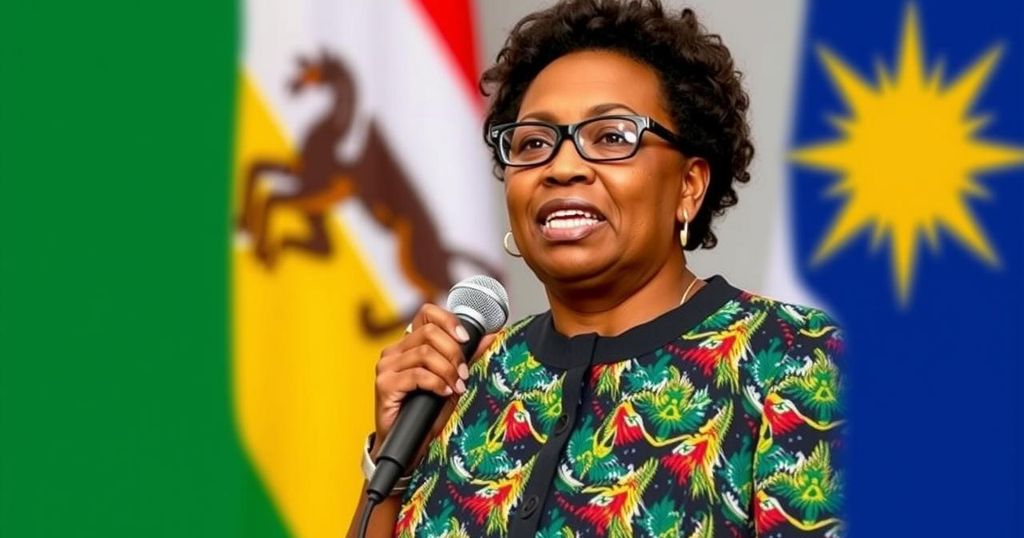World news
AFRICA, BOTSWANA, DEMOCRACY, ELECTIONS, ELECTORAL COMMISSION OF NAMIBIA, EUROPE, GERMANY, GOVERNANCE, GOVERNMENT, HA, INDEPENDENCE MOVEMENT, INDEPENDENT PATRIOTS FOR CHANGE, NAMIBIA, NANDI - NDAITWAH, NET, PAN, PANDULENI ITULA, PARLIAMENTARY SEATS, POLITICAL DYNASTY, SOUTH AFRICA, SWAPO, VP, WINDHOEK
Oliver Grayson
0 Comments
Namibia Elects First Female Leader Amid Controversial Election Results
Namibia elected its first female leader, Vice President Netumbo Nandi-Ndaitwah, who won with 57% of the vote. Despite SWAPO’s continued majority, the election faced significant logistical issues, prompting opposition parties to challenge the results. Nandi-Ndaitwah’s victory marks a historical transition in Namibian politics amid controversies surrounding the electoral process.
Namibia has made history by electing its first female leader, Vice President Netumbo Nandi-Ndaitwah, who was declared the winner of the recent presidential election held by the ruling SWAPO party. Securing 57% of the vote, Nandi-Ndaitwah’s victory defied expectations that she might have to enter a runoff. Her party, which has governed since Namibia’s independence from apartheid South Africa in 1990, has faced challenges but managed to maintain its majority in the parliamentary elections.
The recent elections were marred by significant logistical issues, including a shortage of ballot papers that required the voting period to be extended until the following Saturday. These problems led to opposition parties contesting the election results, citing that the last-minute changes were illegal. They have indicated plans to challenge the legitimacy of the vote in court, further straining the political environment.
Netumbo Nandi-Ndaitwah, who has a long history in Namibian politics, was elevated to the vice presidency earlier this year following the death of President Hage Geingob. As the first woman to assume the presidency, she marks a significant milestone in Namibia’s political landscape. The SWAPO party celebrated the victory by stating, “SWAPO Wins. Netumbo Wins. Namibia Wins. Now Hard Work,” highlighting their commitment to continuing their governance.
Despite the controversies surrounding the election, the SWAPO party has successfully retained its parliamentary authority while opposition parties, notably the Independent Patriots for Change, voiced strong criticism regarding the election process and pledged legal action against the results. The situation remains delicate as Namibia seeks to address these disputes in a manner reflective of its status as one of Africa’s more stable democracies.
Namibia, a country located on the southwestern coast of Africa, has a population of about 3 million people and is recognized for its relative stability and democratic governance. Since its independence from apartheid South Africa in 1990, the SWAPO party has been the dominant political force in the nation, holding power for over three decades. The recent presidential election, which led to the election of the first female president, Netumbo Nandi-Ndaitwah, is significant not only for its historical implications but also due to the political controversies and technical challenges encountered during the electoral process. Opposition parties have raised issues regarding the conduct of the election, expressing concern over the legitimacy of the voting process and the administration of the Electoral Commission.
The election of Netumbo Nandi-Ndaitwah as Namibia’s first female president represents a historic achievement for the nation, reaffirming SWAPO’s prolonged grip on power. However, the election’s integrity is challenged by opposition claims of irregularities and logistical failures, potentially leading to legal disputes. As Namibia navigates this crucial political period, the reaction from both the government and opposition will play a vital role in determining the nation’s democratic future.
Original Source: abcnews.go.com




Post Comment